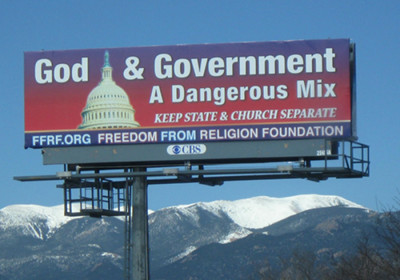Atheism Is Not A Religion, And We Don’t Want Your Tax Breaks: FFRF To Feds

God save the atheists from your followers.
In a story that sounds like something out of Bizarro World, two leading nonbelievers are refusing a tax break from the IRS on the grounds that they are not entitled to it. Annie Laurie Gaylor and Dan Barker, the husband-and-wife team who run the Freedom From Religion Foundation (FFRF), are telling the federal government they do not want a parsonage exemption -- a tax break typically reserved for ministers. But federal attorneys are saying not so fast, suggesting that the atheists may, in fact, qualify.
According to Bob Smietana of the Religion News Service, the standoff is the latest ideological impasse in a legal fight over the constitutionality of tax benefits offered to “ministers of the gospel.” Under current tax laws, ministers may claim their mortgage interest and property tax payments as deductions. The foundation, however, believes that such preferential treatment violates the Establishment Clause of the First Amendment.
In 2009, the foundation filed a federal lawsuit in California to challenge the tax benefits. The lawsuit was eventually dropped and refilled in Wisconsin, the foundation’s home state. In the complaint, FFRF says that Gaylor and Barker currently receive a housing allowance designated by FFRF's governing body. They assert that they do not want or qualify for the allowance as they are promoting non-belief.
However, in a government brief on June 28, federal attorneys argued to the contrary, stating that non-theistic beliefs, including atheism, may qualify as “religious” beliefs in certain contexts because they fulfill a similar role in a person’s life. The lawyers went on to cite Buddhism, Taoism, Ethical Culture and Secular Humanism as belief systems that do not require the belief in a deity and yet could still appoint a qualifying “minister” as defined by the IRS.
In response, Gaylor and Barker wrote declarations, once again affirming their assertion that they are not entitled to the tax break.
“FFRF is not a church, and I am not a minister,” Gaylor wrote in her declaration, filed on July 26. “The Government ignores that a substantial part of the work of FFRF is to promote the constitutional principal of separation of church and state, including by advocacy, education and litigation.”
Barker’s declaration, nearly identical, was equally fervent:
“Atheism is not a belief at all. It is the absence of belief … Atheism has no denominational or even congregational organization or structure. It is not like Christianity, which have an organizational existence and substantive dogma.”
Both Gaylor and Barker say the tax benefits offered to ministers are preferential and discriminatory. Both said they would not claim the exclusion despite federal attorneys’ suggestion that they might be entitled to it.
The lawsuit, meanwhile, will proceed either way. In 2012, U.S. District Judge Barbara Crabb, of the Western District of Wisconsin, issued an opinion letter permitting the FFRF to pursue their challenge. The parsonage exemption has been part of federal tax law since 1954.
Read FFRF’s full legal complaint here.
© Copyright IBTimes 2024. All rights reserved.






















